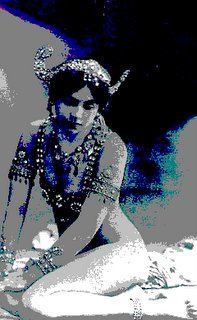
89 years ago today, a 41 year old exotic dancer and courtesan named Margaretha Geertruida Zelle was executed by a French firing squad. Better known by her stage name -- Mata Hari -- the Dutch dancer had been convicted of spying for the Germans.
There is something incredibly sad about Margaretha's life story. A woman of mixed Dutch-Javanese descent, she was born in the Netherlands and moved to Java at 18 with her naval officer husband. They had two children, but she lost custody when the couple divorced.
Margaretha moved to Paris after the divorce, where she eventually became famous -- or infamous -- as an exotic dancer and a courtesan. Although she was well-known for displaying her body, one of the many sad legends about Mata Hari says that even though she was skilled at making love, she was so sensitive about her small breasts that she never uncovered them for her lovers.
As can be expected from an engaging, exotic courtesans, Margaretha had relationships with a number of important men from a number of countries. Before 1914, this only added to her legend. After the war broke out, however, it reeked of treason, even if Margaretha was a neutral citizen, being Dutch.
1917 was a bad year for the French. Casualties were high after slaughterhouses like Verdun and army units mutinied across the length of the front. When the French intercepted and decoded a message implicating the infamous Mata Hari as a German spy, they seized her and tried her for treason. Some people argue that the evidence against Margaretha was weak or even fabricated, but the French authorities had little trouble finding her guilty and sentencing her to death.
The misfortunes of Margaretha did not end with her death. Because her family did not claim the body, it was used for medical study. The head, which had been preserved and sent to an anatomy museum in Paris, disappeared under mysterious circumstances.
I have no idea if Margaretha was guilty or innocent of the espionage charges. It would not surprise me if the French decided to use a foreign woman of "questionable" morals as a scapegoat to distract the masses from the realities of war going sideways. (The French army, after all, had executed men who had refused to fight any longer after having endured three years of indescribable terror.)
What I do know, however, is that Margaretha Geertruida Zelle had an unhappy end to difficult life, and I wish her peace.
No comments:
Post a Comment